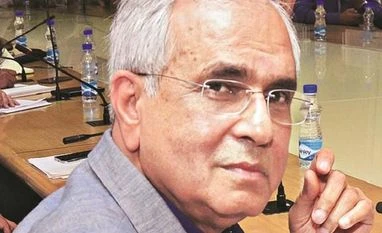NITI Aayog Vice Chairman Rajiv Kumar on Monday said policy formulation and designs are often "very elitist" in India and that a small minority drives the policy paradigm for the greater majority.
At an event organised by The Energy and Resources Institute (TERI) here, Kumar added that policy-making in India was at the crossroads.
"Most often, our policy formulation and designs are very elitist. The two per cent or the ten per cent drive the policy paradigm. And hence a large part of the population thinks that 'they designed the policy and I am the one who suffers because of it'.
"That's the 70 years' history whether we like it or not. So how do we change that," he asked at the launch of the book "Faster, Smarter, Greener: The Future of the Car and Urban Mobility" authored by V. Sumantran.
The Vice Chairman said there were a lot of choices facing India in its journey towards development and urbanisation.
"Policy at the moment is at that crossroad in India. We have that transition to make in urbanisation. We know that 400 million (people) will shift. But where do you want them to shift ultimately? Do you want them to shift there (in the existing urban areas) or do you want to improve your peri-urban (peripheral urban) areas?
"Do we necessarily have to become a country where one per cent of land mass will contribute 85 per cent of the GDP? Or do we follow the rurban (rural-urban) economy model?
More From This Section
"Can we not make use of the immense area that we have got and disperse the density," Kumar asked.
The noted economist said the NITI Aayog was in the midst of formulating two policy documents -- the National Energy Policy and the National Electric Vehicle Policy.
"We have declared that there will be no more non-zero emission cars being manufactured in India beyond 2030. It is a stated goal and will find its way into National Electric Vehicle Policy," Kumar said.
"But that will still leave 60 per cent of our accumulated fleet working on Internal Combustion Engine (ICE) and the question is what do we do with that."
Kumar said that he was under tremendous pressure by "particular groups who would like me to go the hybrid route".
"So do we incentivise hybrid vehicles or do we continue to produce some cars which still run on ICE?"
Kumar said his colleague and Road Transport and Highways Minister Nitin Gadkari had "put the cat among the pigeons" last month by saying he would ban all vehicles based on ICE.
"That's several lakhs of employment, six to seven per cent of GDP and around 60,000 crore worth of component exports that we built up from scratch. These are real issues that we are facing at the moment," Kumar said.
He said while policy-makers - and the elite in India - have accepted that the current model of personalised mobility and the US model of ownership was not viable, but the difficult part was to find out how to take the next step "in the midst of all the complex reality that we live in".
He said that some of the answers are in rooting the policy in the ground reality of India.
--IANS
vv/him/vm
)